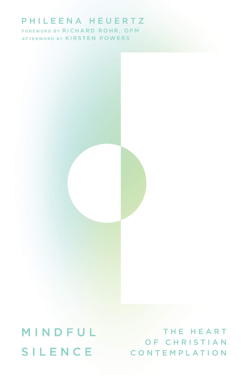
As has become a July tradition at The Well, we have the opportunity to share excerpts of a book we enjoyed this year.
We settled on Mindful Silence: The Heart of Christian Contemplation by Phileena Heuertz because of its invitation to spiritual growth through the practice of contemplative prayer. Her own experience with this practice came after years of Christian work in developing countries, and an inability to reconcile what she witnessed in the world with “what I had learned about God growing up in the Protestant pews of Indiana.” Contemplative prayer became a new way of relationship with God.
While the work to which you are called might not look like hers, might you resonate with the sense of weight of responsibility, important problems which you are not able to fully solve on your own, and a general exhaustion? This invitation to contemplative prayer offers a way forward when you’re not sure what to make of your faith anymore.
We hope the introduction to Mindful Silence is meaningful for you too. Come back each Thursday in July for another glimpse into this book!
— Andrea Bridges
Becoming a Mystic
by Phileena Heuertz, excerpted from Mindful Silence: The Heart of Christian Contemplation

The intensity of a vocation among impoverished people led me into a crisis of faith. Coming to the end of our self will often do that. Essentially, I had come to the limits of an active life dissociated from contemplation.
When I started to experience the psychological and energetic benefits of centering prayer, my vocation took on new expression. I didn’t serve in the same way that I had before — from my limited false self. I was beginning to serve from what Rahner so eloquently described as “a genuine experience of God emerging from the very heart of existence.”
I was awakening to a new dimension of faith — where my beliefs in God were no longer simply intellectual ideals, but rather a lived reality. I was experiencing God in prayer, and I was being changed. Those changes necessarily affected my relationships, my community, and my vocation.
Now, because our ideas of mysticism have been reduced to the ecstatic experiences of saints like Teresa of Àvila (who is known to have experienced trance states and levitation), let me be clear. My experiences of God were much, much less dramatic. During centering prayer, there were seldom tangible signs of anything taking place.
Sometimes I would experience intense pain in my back or uncontrollable sorrow evidenced by a waterfall of tears. But most of the time, all appeared quiet and still to the casual passerby.
Sure, my mind might not have been as quiet and still as I would have liked, but slowly an interior silence and stillness was building, which allowed for what Father Thomas calls “divine therapy” to take place. Emotional wounds of a lifetime that I had stored in my body and psyche began to heal. My over-attachment to power and control, affection and esteem, and security and survival began to loosen. My false self came into view. As I learned to self-observe, I was empowered to self-correct. The consequence is being able to live more often from my true self.
As time went on, I was so convinced that contemplative practice was crucial for our community that I wanted everyone to adopt a practice like centering prayer. But few were interested. I remember the push back and resistance: “That way of prayer is for introverts.” “I pray by doing.” “I experience God in the active life, and that’s good enough for me.” “Contemplation is for the religious, cloistered life.” “That’s just navel-gazing.”
Even our community was affected by the active-contemplative dichotomy of religious consciousness. But I had stumbled into the “mixed life,” and like Rahner, I knew it was the way of the future. Our society, our human family, our planet depends on it.
In time, by withdrawing a few times a day for contemplative prayer, I realized that solitude was not a disconnection from the rest of the world but instead a necessary recalibration for more meaningful connection with the world.
*Taken from Mindful Silence by Phileena Heuertz. Copyright (c) 2018 by Phileena Heuertz. Published by InterVarsity Press, Downers Grove, IL. www.ivpress.com
If you enjoyed this excerpt, consider purchasing Phileena's book using the 40% off discount code (including free US shipping) that InterVarsity Press is offering readers of The Well: WELL4649
. (Good through September 30, 2019 on the title Mindful Silence.)